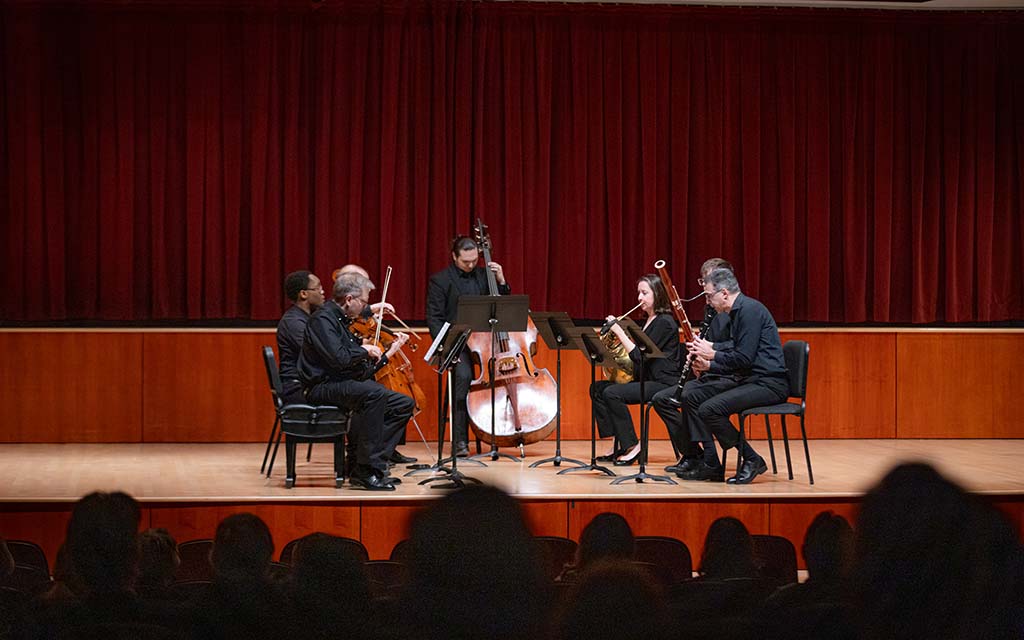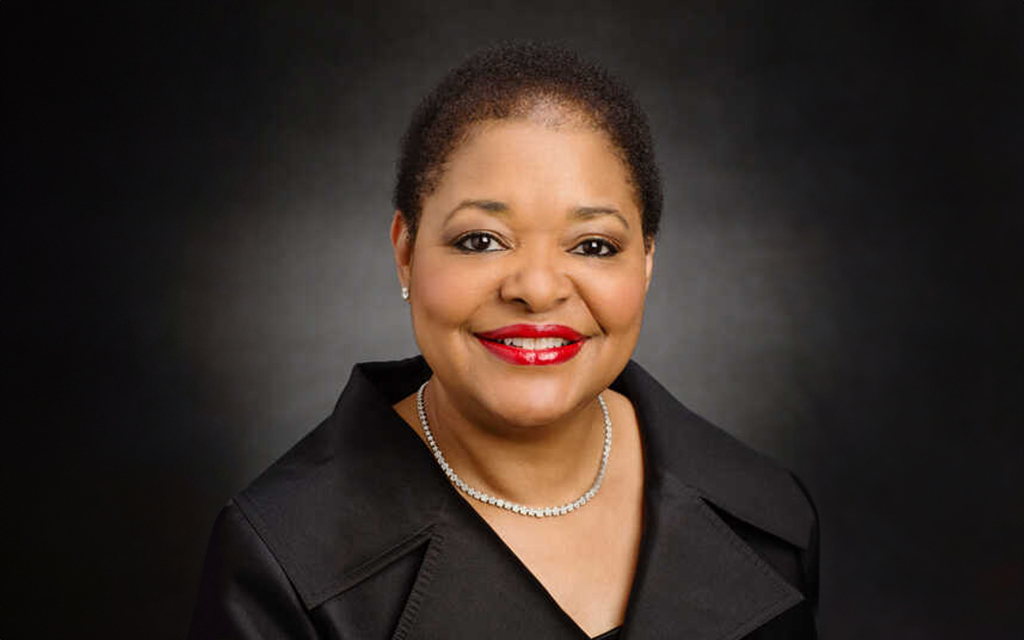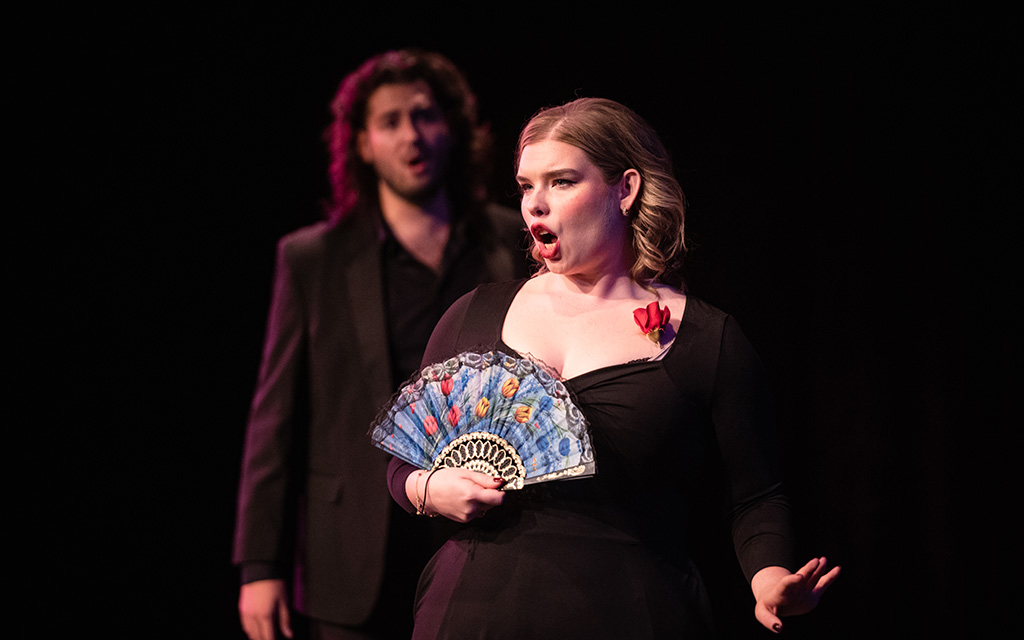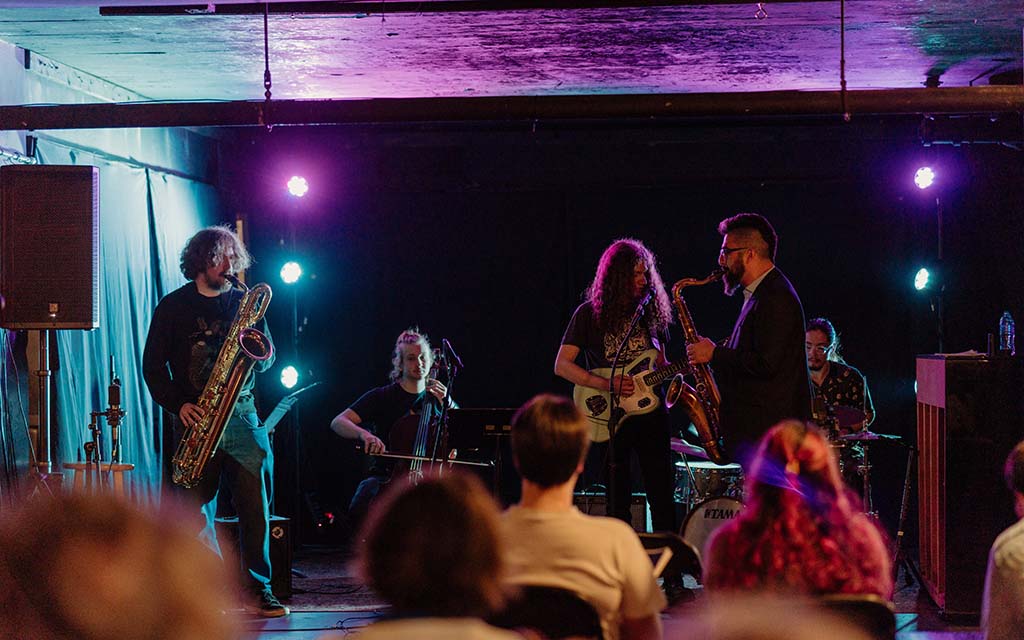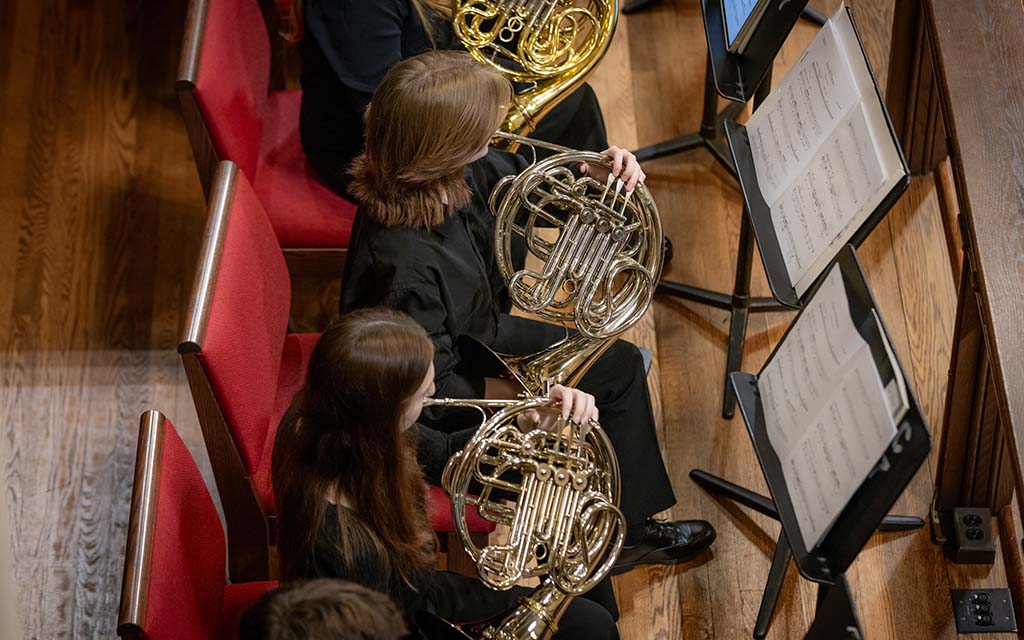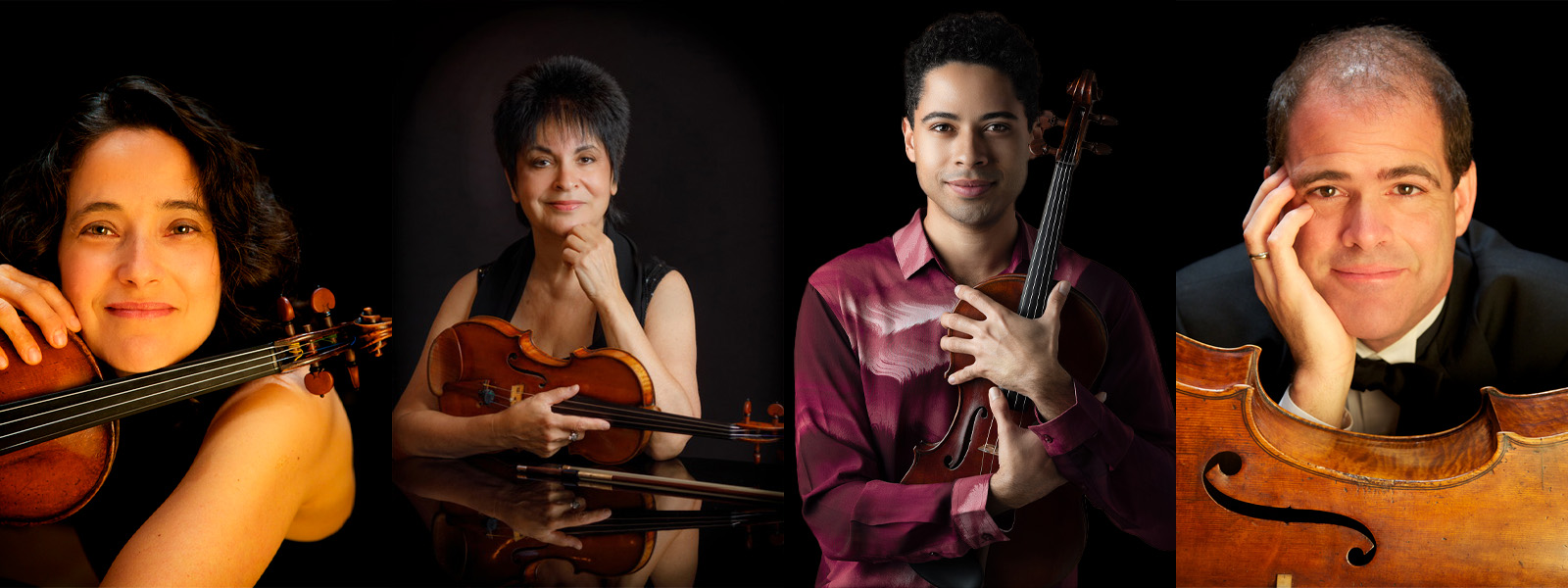The Reynolda Quartet returns to Reynolda for a concert of works by Beethoven and Dvořák
The Reynolda Quartet, composed of acclaimed faculty artists in the School of Music at UNCSA, returns to the Reynolda House Museum of American Art this Sunday, for a program titled “Genius in Transition,” which will spotlight the brilliance and gravity of Antonin Dvořák and Ludwig van Beethoven at critical moments in their careers.
The performance will be at 2:30 p.m. on Sunday, April 28, at Reynolda House Museum of American Art, 2250 Reynolda Road. Tickets are $25 for adults online or by calling the box office at 336-721-1945. UNCSA and Wake Forest University students, faculty and staff get in free with advance registration.
Founded in 2019 as a partnership between two of Winston-Salem’s premier cultural organizations, Reynolda House Museum of American Art and UNCSA, today the quartet includes world-renowned musicians Ida Bielerand Janet Orenstein, violins; Jordan Bak, viola; and Brooks Whitehouse, cello.
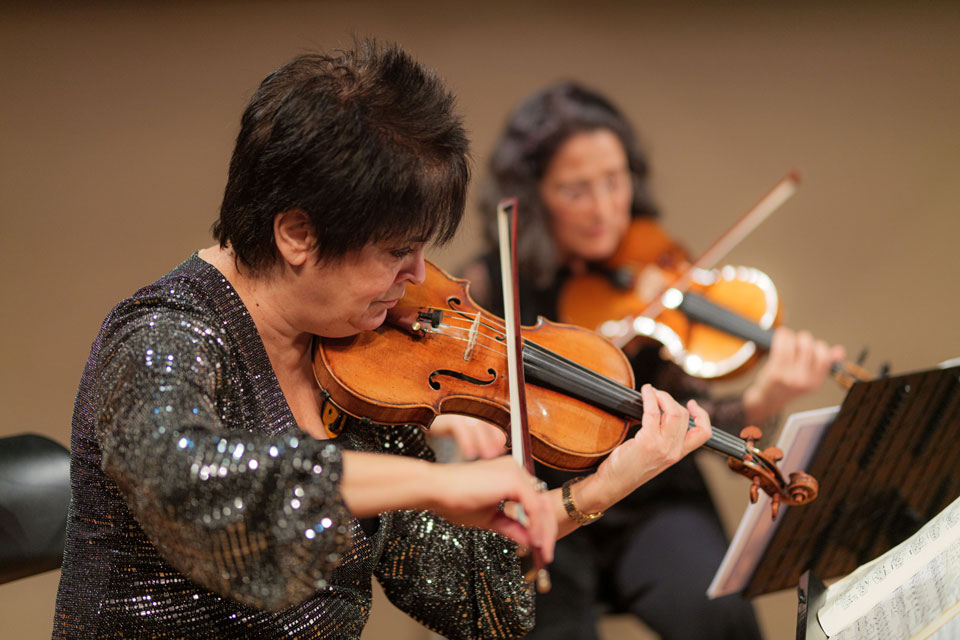
Ida Bieler and Janet Orenstein
"This is another beautifully programmed concert from the Reynolda Quartet,” said Phil Archer, Betsy Main Babcock Deputy Director for Reynolda House Museum of American Art. “These four artist-scholars never fail to pair pieces in illuminating ways, and they introduce their themes with just the right amount of biographical background to enable us to listen for the emotional and intellectual wellsprings on which the composers drew. 'Genius in Transition' invites us to enjoy majestic works composed at watershed moments in these composers' lives."
The April concert will feature two works: String Quartet in F minor, Op. 95, "Serioso" by Beethoven (1770-1827) and String Quartet in A-flat major, Op. 105, by Dvořák (1841-1904).
Dvořák's transcendent Quartet Op.105 signifies the culmination of his "American" phase, characterized by the iconic "New World Symphony," and reflects a return to his Czech heritage, Bieler said. Infused with inventive chromaticism reminiscent of his compatriot Leoŝ Janáček, this piece heralds a new chapter in Dvořák's musical evolution.
Beethoven's “Serioso” Quartet commands attention with its stark brevity and palpable intensity, Bieler continued. It serves as a bridge between the composer’s middle and late periods. A harbinger of the monumental late quartets, the F minor quartet’s fervent energy and profound emotional depth captivate audiences, offering a glimpse into the genius of the maestro.
“These very different pieces are both very serious, highly dramatic and thoughtful,” she said. “This is a program of passion and everybody was dying to play it. It has qualities of drama, seriousness and darkness.
“The F minor is an extraordinary piece for Beethoven,” she continued. “He experimented with the form and created a unique compactness. In contrast, in his piece, Dvořák wanted big, generous melodies. It’s a great tour de force of his ability to write variations.”
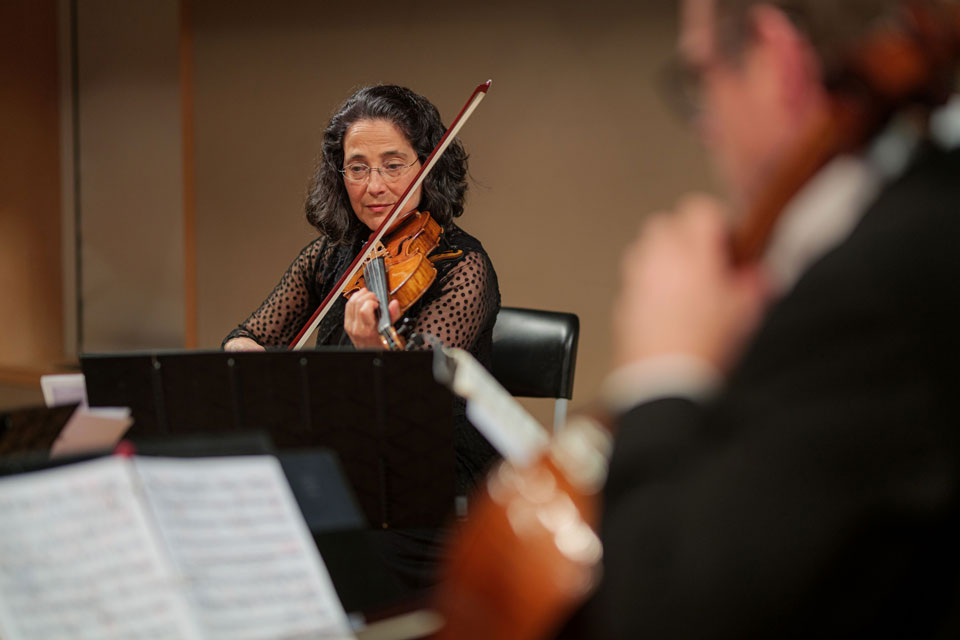
Janet Orenstein
Considered one of the giants of the first Viennese School, Beethoven, along with Haydn and Mozart, developed the Classical period of music that came after the Baroque and the shorter Rococo periods.
“Beethoven’s F minor isn’t a walk in the park,” Bieler said. “It’s a most brooding and ruminative piece and served as a role model for works by many subsequent composers. We all study from it and learn from it.”
“From my point of view, Dvořák is personal and intimate and has a great melodic gift and a love of folk music,” said Whitehouse. “His music is very touching and very human in that way. My sense of him is that he was comfortable in his own skin. He wasn’t fighting the world the way Beethoven was. That’s not to say that there are not great melodies and intimacy in Beethoven.
“The Dvořák piece is expansive and lyrical. The Beethoven piece is on the cusp of his late period. It’s very terse, direct and ferocious – the nickname is ‘Serioso.’ It marks a turning point toward his late period. He’s turning toward the most challenging music that he wrote. He’s breaking rules, breaking down doors and changing the musical world forever. It packs a real punch. It’s full of ferocious energy.”
Bieler explains that some composers like to write two pieces simultaneously.
“Dvořák’s last two pieces were written together,” she said. “One dark and one light — Op. 105 and Op. 106. They are fascinating works: big, huge movements in contrast to the Beethoven, which is compact.
“Before this, Dvořák was writing in America, based on folk songs,” she continued. “He returned to Czechoslovakia and wrote new work inspired by music of his home, but still reflecting on his American period. After these, he wrote another nine or 10 pieces but no more quartets.”
About the Reynolda Quartet
Award-winning Jamaican American violist Jordan Bak has achieved international acclaim as a trailblazing artist, praised for his radiant stage presence, dynamic interpretations and fearless power. Bak has appeared as soloist with such orchestras as Sarasota Orchestra, London Mozart Players, New York Classical Players, Juilliard Orchestra and Brandon Hill Chamber Orchestra, and has performed under such esteemed conductors as Howard Griffiths, Stephen Mulligan, Keith Lockhart, Gerard Schwarz and Ewa Strusińska.
As a recitalist and chamber musician, he has been heard at some of the world’s greatest performance venues including Carnegie Hall, Alice Tully Hall, Wigmore Hall, Jordan Hall, Merkin Concert Hall, Princeton University Concerts, Perelman Theater at The Kimmel Center, Elgar Concert Hall and Helsinki Musiikkitalo.
Before joining the UNCSA Music faculty as assistant professor of viola, Bak was a faculty member of Bowling Green State University in Ohio and served as a visiting artist and ambassador for Music Masters in London. Bak was only the third violist ever to earn the Artist Diploma from The Juilliard School, where he was awarded the prestigious Kovner Fellowship.
An alumna of the UNCSA School of Music, Ida Bieler joined the faculty in 2013. She has won prestigious music competitions on three continents, has been a regular performer in major music capitals throughout the world, has recorded for radio and television on five continents and has appeared with leading international orchestras. She is on the faculty of both the Robert Schumann Hochschule in Düsseldorf, Germany, and Kunstuniversität Graz in Austria. Bieler is the creator and director of the Vivaldi Project, a teacher training program in Düsseldorf and at UNCSA, aimed at educating underprivileged youth.
Husband and wife string musicians Brooks Whitehouse and Janet Orenstein are founding members of The Guild Trio, winner of both the United States Information Agency Artistic Ambassador and the Chamber Music Yellow Springs competitions. The ensemble has performed throughout the United States and Canada, as well as Europe and Australia. The trio has been a frequent feature on National Public Radio's “Performance Today,” and has also appeared on the University of Missouri’s public television series “Premiere Performances,” and “Front Row Center” on KETC-TV9 in St. Louis.
Orenstein has performed in the U.S. and abroad as a chamber musician, soloist and advocate of contemporary music. As a chamber musician, she has appeared in New York’s Alice Tully and Merkin concert halls, as well as at the Kennedy Center in Washington, D.C. Orenstein has performed at the Apple Hill Chamber Music Festival in Nelson, New Hampshire; the Green Mountain Chamber Music Festival in Burlington, Vermont; and the International Musicians Seminar at Prussia Cove in Cornwall, England. She joined the UNCSA faculty in 2012 and has taught violin and chamber music at the University of Virginia, UNC-Greensboro (UNC-G) and Wake Forest University.
Whitehouse has performed and taught throughout the United States and abroad, holding artist-in-residence positions at the State University of New York Stony Brook; the Guild Hall in East Hampton, New York; the University of Virginia; and Tanglewood Music Center. As a soloist, he has appeared with the Boston Pops, the New England Chamber Orchestra and other orchestras. His recitals throughout the northeastern United States have been broadcast on WQXR’s “McGraw-Hill Young Artist Showcase,” WNYC’s “Around New York” and the Australian and Canadian Broadcasting Corporation networks. Whitehouse is also cellist for the European-based Atma Trio and for the Low and Lower duo with bassist Paul Sharpe. He has recorded for the Centaur, CRI and Innova labels. Before joining the faculty of UNCSA, Whitehouse taught at the University of Florida and UNC-G.
About Reynolda
Reynolda is set on 170 acres in Winston-Salem, and comprises Reynolda House Museum of American Art, Reynolda Gardens and Reynolda Village Shops and Restaurants. The museum presents a renowned art collection in a historic and incomparable setting: the original 1917 interiors of Katharine and R.J. Reynolds’s 34,000-square-foot home. Its collection is a chronology of American art and featured exhibitions are offered in the Museum’s Babcock Gallery and historic house bedrooms. The Gardens serve as a 134-acre outdoor horticultural oasis open to the public year-round, complete with colorful formal gardens, nature trails and a greenhouse. In the Village, the estate’s historic buildings are now home to a vibrant mix of boutiques, restaurants, shops and services. Plan your visit at reynolda.org and use the mobile app Reynolda Revealed to self-tour the estate.
Get the best news, performance and alumni stories from UNCSA.
SUBSCRIBE TO OUR NEWSLETTERS(OPENS IN NEW TAB)(OPENS IN NEW TAB)(OPENS IN NEW TAB)(OPENS IN NEW TAB)(OPENS IN NEW TAB)(OPENS IN NEW TAB)(OPENS IN NEW TAB)(OPENS IN NEW TAB)(OPENS IN NEW TAB)(OPENS IN NEW TAB)(OPENS IN NEW TAB)(OPENS IN NEW TAB)(OPENS IN NEW TAB)(OPENS IN NEW TAB)(OPENS IN NEW TAB)(OPENS IN NEW TAB)(OPENS IN NEW TAB)(OPENS IN NEW TAB)(OPENS IN NEW TAB)(OPENS IN NEW TAB)
April 23, 2024
